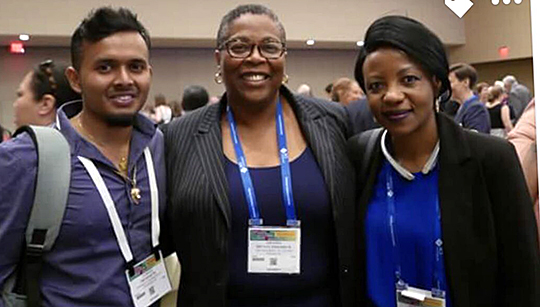Dr. Amanda Bryant-Friedrich and Dr. Paul Erhardt were recognized at the American Chemical Society’s fall national meeting last month in Boston.
Bryant-Friedrich, interim dean of the College of Pharmacy and Pharmaceutical Sciences, was named a Fellow of the American Chemical Society, and Erhardt, Distinguished University Professor of Medicinal Chemistry, was inducted into the American Chemical Society Medicinal Chemistry Division Hall of Fame.

Dr. Amanda Bryant-Friedrich, center, posed for a photo with Gurdat Premnauth, UT alumnus who received a master of science degree in chemistry in 2016, left, and Immaculate Sappy, a PhD candidate in the UT Department of Medicinal Chemistry, at the American Chemical Society’s fall national meeting last month in Boston. Bryant-Friedrich was named a Fellow of the American Chemical Society.
Bryant-Friedrich joined the University in 2007 as an associate professor in medicinal and biological chemistry in the College of Pharmacy and Pharmaceutical Sciences. In 2016, she was appointed dean of the College of Graduate Studies, and on Sept. 1, she was named interim dean of the College of Pharmacy. She is vice provost for graduate affairs, professor of medicinal and biological chemistry, and director of the University’s Shimazdu Laboratory for Pharmaceutical Research Excellence.
She received a bachelor of science degree in chemistry at North Carolina Central University, a master’s degree in chemistry from Duke University, and a doctorate in pharmaceutical chemistry from Ruprecht-Karls Universität in Germany. In addition, she conducted postdoctoral studies at the University of Basel in Switzerland.
“After spending several years at an undergraduate-serving institution, I decided that having a larger research focus would allow me to offer more students opportunities,” Bryant-Friedrich said. “The University of Toledo has a research and teaching mission aligned with my interest as well as a globally diverse student body. When offered the opportunity to join this community, I couldn’t say no.”
Her research interests include modified nucleic acids; biomarkers; DNA and RNA damage; photochemistry; mass spectrometry; ionizing radiation; and women in science.
“It is important to me to remain active as a researcher to continue to provide training and research opportunities for students from around the world and right here in northwest Ohio,” said Bryant-Friedrich, one of 12 women named a Fellow this year. “So many questions still remain about the origins of disease, and I hope to continue to contribute to our understanding of the root of diseases such as cancer and Alzheimer’s while searching for new treatments for viral infection.”

Dr. Paul Erhardt, right, received a plaque from Dr. Paul Ornstein, chair of the American Chemical Society Medicinal Chemistry Division, during the Hall of Fame induction ceremony last month in Boston.
He has been a member of the American Chemical Society for nearly 50 years. His early career began in the private sector, first at American Critical Care Labs and then at Berlex Laboratories, where he rose to the rank of assistant director of research and global development. After 20 years, he transitioned to academia and joined The University of Toledo with a desire to share his knowledge and research skills with students.
The American Chemical Society Division of Medical Chemistry Hall of Fame inducts those who have made outstanding contributions to medicinal chemistry through research, teaching and/or division service.
“With regard to the hall of fame award, I am enormously proud as this is the highest acknowledgement that can be bestowed within my chosen field of endeavor,” Erhardt said.
He received a bachelor of arts degree in chemistry and doctorate in medicinal chemistry from the University of Minnesota. He did postdoctoral studies in drug metabolism while at the University of Texas at Austin.
Erhardt is well-known for the pioneering discovery and development of esmolol, a soft drug used in emergency settings that continues to save numerous lives on a daily basis around the globe. He has written more than 125 publications and received more than 50 U.S. patents.
He has been an active member of the International Union of Pure and Applied Chemistry, where he served as president of Division VII Chemistry and Human Health.
“I plan to retire and assume an emeritus position where I can continue to pursue research,” Erhardt said. “One hobby project that I have never had time for is to establish a human drug metabolism database on the internet akin to the protein database that can be used by all investigators across the globe who are interested in such a topic.”